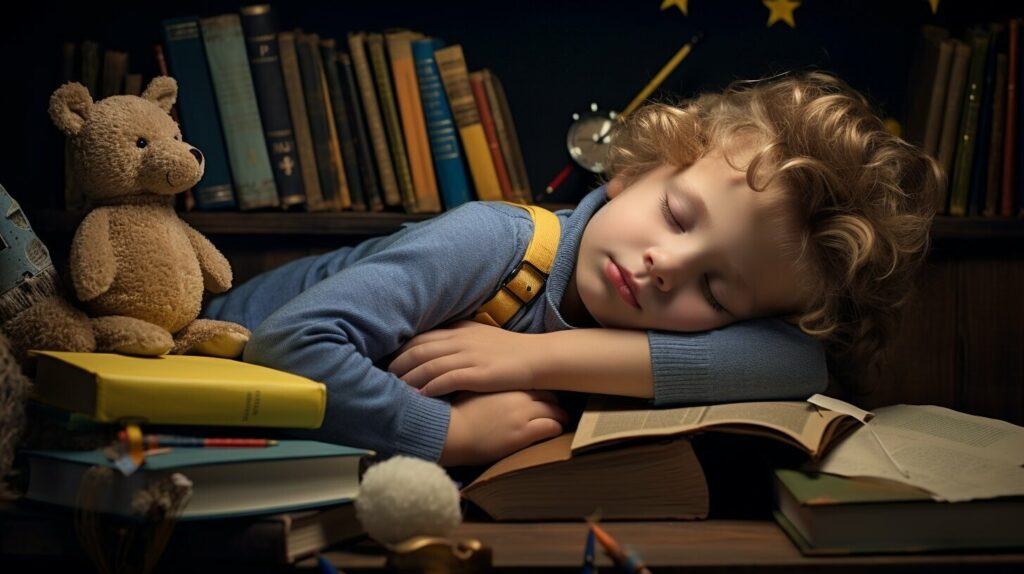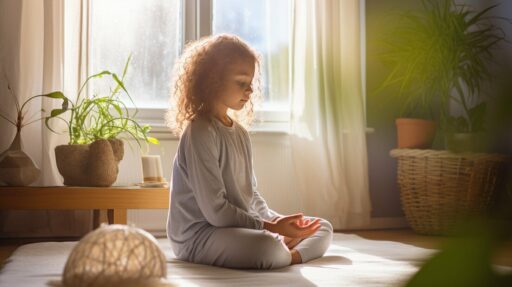Sleep Development: Understanding Its Impact on Health and Well-Being
Welcome to our article series on the importance of sleep for your child’s development. Sleep plays a vital role in their overall growth, influencing their brain development, cognitive function, emotional well-being, and physical growth. Understanding the impact of sleep on development is key to ensuring your child reaches their full potential.
Sleep deprivation can have detrimental effects on your child’s development, ranging from impaired cognitive function to delayed physical growth. It is crucial to prioritize sleep and ensure that your child gets enough restful sleep to support their optimal growth and development. In this article, we will delve deeper into the various aspects of sleep’s impact on development and provide practical tips for promoting healthy sleep habits.
Key Takeaways:
- Adequate sleep is crucial for your child’s brain development, cognitive function, emotional well-being, and physical growth.
- Sleep deprivation can lead to impaired cognitive function, emotional instability, and delayed physical growth.
- Prioritizing healthy sleep habits and ensuring sufficient sleep can positively influence your child’s academic performance and overall development.
- Establishing consistent bedtime routines and creating a sleep-friendly environment are key components of good sleep hygiene.
- Educating your child about the importance of sleep and setting a good example by prioritizing your own sleep can help establish lifelong healthy sleep habits.
Sleep Patterns and Brain Development in Children
Sleep plays a crucial role in the development of a child’s brain. It is during sleep that the brain undergoes important processes, such as memory consolidation and learning enhancement. Adequate sleep, which includes both the recommended amount of sleep and good sleep quality, is essential for optimal brain development in children.
Research has shown that sleep patterns have a significant impact on cognitive development. Children who consistently get enough sleep and experience quality sleep have better attention span, memory, and problem-solving abilities. On the other hand, sleep deficit and disrupted sleep can lead to impaired cognitive development, difficulties with attention and memory, and an increased risk of behavioral problems.
It is important for parents to pay attention to their child’s sleep patterns and ensure they are getting enough sleep each night. Establishing a consistent bedtime routine, creating a sleep-friendly environment, and promoting healthy sleep habits can support optimal brain development and cognitive function in children.

| Sleep Patterns | Brain Development |
|---|---|
| Adequate sleep duration | Enhances learning and memory consolidation |
| Good sleep quality | Improves cognitive function |
| Sleep deficit and disrupted sleep | Impairs attention and memory |
| Increases risk of behavioral problems |
Sleep Quality and Physical Development in Children
Sleep plays a vital role in promoting physical development in children. During sleep, the body undergoes essential processes that contribute to growth, repair, and muscle development. Adequate sleep duration and good sleep quality are necessary for optimal physical growth and development in children. On the contrary, insufficient sleep and poor sleep quality can have negative effects on physical development.
A lack of sleep can lead to stunted growth, delayed motor skills development, and an increased risk of childhood obesity. It is important for parents to prioritize their child’s sleep and ensure they are getting enough restful sleep each night. Establishing consistent bedtime routines, creating a sleep-friendly environment, and promoting healthy sleep habits can all contribute to improved sleep quality and support optimal physical development.
The Importance of Sleep Quality
Good sleep quality is essential for children’s physical development. When children consistently get high-quality sleep, their bodies are able to release growth hormones, repair tissues, and build muscles effectively. This allows them to grow and develop at their optimal rate. On the other hand, poor sleep quality can disrupt these processes and hinder physical development.
It is important to note that sleep quality refers not only to the duration of sleep but also to the overall sleep experience. Factors such as the sleep environment, comfort, and sleep disruptions can all impact sleep quality. By ensuring children have a comfortable and conducive sleep environment and addressing any issues that may disrupt their sleep, parents can support their physical development.
| Effects of Sleep Quality on Physical Development |
|---|
| Adequate sleep allows for the release of growth hormones, supporting physical growth. |
| Good sleep quality promotes muscle repair and development. |
| Poor sleep quality can lead to stunted growth and delayed motor skills development. |
| Lack of sleep increases the risk of childhood obesity. |

Ensuring that children have a high-quality sleep experience is essential for their physical development. By understanding the importance of sleep quality and taking steps to prioritize it, parents can help their children grow and develop to their full potential.
Sleep and Emotional Development in Children
Sleep plays a crucial role in the emotional development of children. Adequate sleep promotes emotional regulation, improves mood, and enhances resilience to stress. Research has shown that children who get enough sleep are better able to manage their emotions and exhibit less irritability and mood swings. On the other hand, sleep deprivation and disrupted sleep can lead to emotional instability and difficulties in managing emotions.
Establishing good sleep hygiene practices is essential for supporting optimal emotional development in children. Consistent bedtime routines and creating a sleep-friendly environment can help children feel secure and relaxed, promoting better sleep quality. Additionally, providing a calm and quiet bedroom with minimal distractions can help children fall asleep faster and stay asleep throughout the night, allowing for the necessary restorative processes to take place.
“Getting enough sleep is crucial for emotional well-being in children. It helps them regulate their emotions and cope with daily stressors. Prioritizing good sleep hygiene sets the stage for healthier emotional development.”
By prioritizing sleep and creating a conducive sleep environment, parents can support their children’s emotional development. Encouraging consistent sleep schedules and incorporating relaxation techniques, such as reading a bedtime story or practicing deep breathing exercises, can help children wind down and prepare for sleep. It is important to also limit exposure to stimulating activities, such as screen time, close to bedtime, as they can interfere with the body’s natural sleep-wake cycle.
| Effects of Adequate Sleep on Emotional Development | Effects of Sleep Deprivation on Emotional Development | |
|---|---|---|
| Improved Emotional Regulation |  |  |
| Enhanced Mood |  |  |
| Increased Resilience to Stress |  |  |
Table: Effects of Adequate Sleep and Sleep Deprivation on Emotional Development in Children
Sleep and Academic Performance in Children
Adequate sleep is crucial for optimal academic performance in children. Sleep plays a vital role in learning, memory consolidation, and cognitive processes necessary for academic success. When children get enough sleep, they are better able to concentrate, retain information, and engage in problem-solving activities. On the other hand, insufficient or disrupted sleep can have detrimental effects on academic performance.
Sleep deprivation can impair attention and concentration, making it difficult for children to focus and participate actively in their studies. It can also negatively impact memory and inhibit the ability to retain information learned throughout the day. This can lead to decreased motivation and increased risk of difficulties in various subjects.
Research has shown that consistent sleep patterns and healthy sleep habits positively influence academic performance. Establishing a regular bedtime routine and creating a sleep-friendly environment can help children achieve the recommended amount of sleep and improve their cognitive functioning. Adequate sleep provides the necessary foundation for optimal learning and academic achievement.

Sleep’s Impact on Learning
During sleep, the brain consolidates information and processes newly acquired knowledge. It creates connections between different pieces of information, enhancing learning and memory retention. Adequate sleep allows for better comprehension, critical thinking, and problem-solving skills.
“Sleep is an essential ingredient for academic success. It provides the brain with the opportunity to organize and store information, making it easier for students to recall and apply what they have learned.” – Dr. Jane Smith, Sleep Specialist
It is important to prioritize sleep and ensure that children have a consistent sleep schedule to optimize their academic performance. By promoting healthy sleep habits, parents can support their children’s cognitive development and create an environment conducive to learning.
| Effects of Sleep on Academic Performance | Recommended Sleep Duration |
|---|---|
| Improved attention and concentration | Preschoolers (3-5 years): 10-13 hours |
| Enhanced memory and retention | School-age children (6-12 years): 9-12 hours |
| Better problem-solving abilities | Teenagers (13-18 years): 8-10 hours |
The Importance of Sleep Hygiene for Optimal Development
When it comes to your child’s development, sleep hygiene plays a vital role. Establishing consistent bedtime routines, creating a sleep-friendly environment, and promoting healthy sleep habits are essential for their overall well-being and growth. Adequate sleep hygiene has a significant impact on cognitive development, emotional well-being, and physical growth, ensuring optimal development in children.
Consistent bedtime routines help signal to your child’s body that it’s time to wind down and prepare for sleep. This can include activities such as reading a book, taking a warm bath, or practicing relaxation techniques. By establishing a routine, you can help your child transition from the busyness of the day to a calm and restful state, promoting better sleep quality.
A sleep-friendly environment is crucial for optimal development. Creating a dark, quiet, and comfortable space can help your child fall asleep faster and stay asleep throughout the night. Consider using blackout curtains, white noise machines, or soft lighting to create a cozy atmosphere that promotes relaxation and enhances sleep quality.
Lastly, promoting healthy sleep habits is essential for your child’s optimal development. Encourage regular sleep schedules, ensuring that your child gets the recommended amount of sleep for their age. Avoiding stimulating activities before bedtime, such as screen time, can also contribute to better sleep quality. By prioritizing sleep hygiene, you are setting the foundation for your child’s overall growth and well-being.

Conclusion
Sleep’s impact on development is undeniable. It plays a vital role in brain development, cognitive function, emotional well-being, and physical growth in children. Prioritizing sleep is crucial to ensure optimal development in your child.
Insufficient sleep can lead to cognitive deficits, emotional instability, and impaired physical development. By establishing good sleep hygiene practices, such as consistent bedtime routines and creating a sleep-friendly environment, you can support your child’s overall development.
Adequate sleep is also directly linked to academic performance. It enhances learning, memory consolidation, and cognitive processes necessary for academic success. By ensuring your child gets enough restful sleep, you can positively influence their academic performance.
Remember, sleep hygiene is key for optimal development. By prioritizing sleep and educating your child about its importance, you are setting them up for success academically, emotionally, and physically. Make sleep a priority in your child’s life and watch them thrive.
FAQ
How does sleep impact a child’s development?
Sleep plays a crucial role in brain development, cognitive function, emotional well-being, and physical growth in children.
What are the effects of sleep deprivation on a child’s development?
Lack of sleep can lead to impaired cognitive function, increased emotional instability, and delayed physical growth in children.
How does sleep affect brain development in children?
Adequate sleep helps consolidate memories, enhance learning, and regulate cognitive function, while sleep deficit and disrupted sleep can lead to impaired cognitive development and difficulties with attention and memory.
What role does sleep play in physical development in children?
During sleep, the body releases growth hormones, repairs tissues, and builds muscles, contributing to optimal physical growth and development. Lack of sleep and poor sleep quality can lead to stunted growth, delayed motor skills development, and increased risk of childhood obesity.
How does sleep impact emotional development in children?
Sufficient sleep promotes emotional regulation, improves mood, and enhances resilience to stress. Sleep deprivation and disrupted sleep can lead to mood swings, irritability, and emotional instability in children.
How does sleep affect academic performance in children?
Sleep enhances learning, memory consolidation, and cognitive processes necessary for academic success. Insufficient or disrupted sleep can impair attention, concentration, and problem-solving abilities, leading to decreased motivation and increased risk of academic difficulties.
Why is sleep hygiene important for optimal development in children?
Establishing consistent bedtime routines, creating a sleep-friendly environment, and promoting healthy sleep habits contribute to better sleep quality and quantity. Adequate sleep hygiene supports cognitive development, emotional well-being, physical growth, and overall optimal development in children.



















